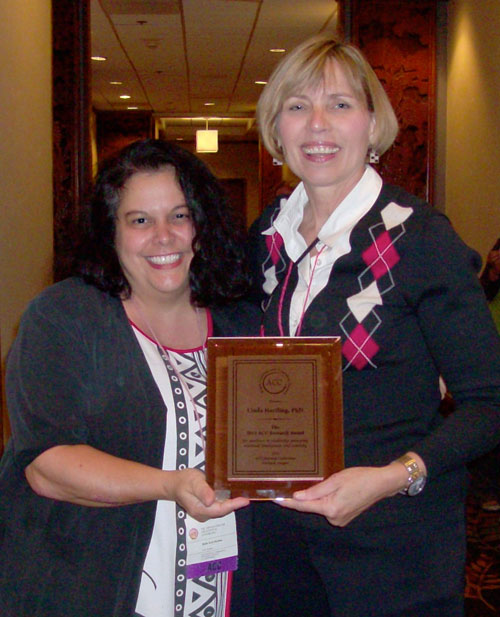|
Linda M. Hartling, Ph.D.
Director
Life & Work
Linda Margaret Hartling, Ph.D., is the recipient of the 2015 Human Dignity (Half!) Lifetime Commitment Award.
Linda Hartling is the Director of Human Dignity and Humiliation Studies (HumanDHS) and contributes to the leadership and development of workshops, conferences, Dignity Press publications, and the World Dignity University initiative. She works in daily collaboration with HumanDHS Founding President Evelin Lindner and is the orchestrator and key creator of the Dignity Letter. She is also a Member of the HumanDHS Global Core Team, HumanDHS Global Coordinating Team, HumanDHS Research Team, and HumanDHS Education Team. Furthermore, she was the Editor of the Journal of Human Dignity and Humiliation Studies (JHDHS). The concept for the HumanDHS E-frastructure was created by Linda in 2009.
Until November 3, 2008, Linda Hartling was the Associate Director (archive) of the Jean Baker Miller Training Institute (JBMTI) at the Stone Center, which is part of the Wellesley Centers for Women (WCW) at Wellesley College, Wellesley, Massachusetts. She worked closely with Jean Baker Miller, MD, and other colleagues on the development of Relational-Cultural Theory, which is a new model of psychological development. Dr. Hartling was a member of the JBMTI theory-building group advancing the practice of this theory. In addition, Dr. Hartling coordinated and contributed to training programs, publications, and special projects for the JBMTI. Dr. Hartling was also co-editor of The Complexity of Connection: Writings from the Jean Baker Miller Training Institute at the Stone Center (2004) and os co-authored many papers published by the Jean Baker Miller Training Institute (JBMTI). See Works in Progress, a publication series developed by the two organizations that were the precursors to the International Center for Growth in Connection: the Stone Center and the Jean Baker Miller Training Institute, both at Wellesley College.
Jean Baker Miller and Seymour M. (Mike) Miller were our 2011 Lifetime Commitment Award recipients!
Dr. Hartling holds a doctoral degree in clinical/community psychology and has published papers on resilience, substance abuse prevention, shame and humiliation, relational practice in the workplace, and Relational-Cultural Theory.
See:
• Hartling, Linda Margaret (1995/1996). Humiliation: Assessing the Specter of Derision, Degradation, and Debasement.
Doctoral dissertation. Cincinnati, OH: Union Institute Graduate School.
Linda Hartling has developed the Humiliation inventory, a scale to assess the internal experience of derision and degradation, using a scale of 1 to 5 to gauge the extent to which a person feels harmed by humiliating incidents throughout her life and how much she fears "being teased, bullied, scorned, excluded, laughed at, or, harassed." This scale has been used around the world in research exploring the link between humiliation and a wide variety of social and psychological concerns, including global poverty, depression, facial disfigurement, narcissism, eating disorders, immigration, and emotional isolation. It has been translated into Italian, French, Japanese, Portuguese, Russian, Korean, and Norwegian. It has been crucial in extending the global research on humiliation.
See:
• Hartling, Linda Margaret, and Tracy Luchetta (1999). "Humiliation: Assessing the impact of derision, degradation, and debasement." In The Journal of Primary Prevention, 19 (5), pp. 259–78. doi: 10.1023/A:1022622422521. (Please contact her if you wish to translate this inventory into your language.)
Dr. Hartling is the recipient of the 2010 Association for Creativity in Counseling Research Award presented by the Association for Creativity in Counseling, American Counseling Association (see the slides of her acceptance talk). She is also the recipient of the 2015 Human Dignity (Half!) Lifetime Award. Please see the Video and Powerpoint presentation of Evelin Lindner's announcement. See also the many good wishes for Linda on her 60th birthday page, she turned 60 at the end of December 2015. Thank you, dear Anne Wyatt-Brown, for your lovely letter to Linda!
Dr. Hartling is part of Humans for Peace Education!
Linda Hartling co-edited this important book, she wrote the Foreword and the final chapter:
"Moving Beyond Humiliation: A Relational Conceptualization of Human Rights." In Human Dignity: Practices, Discourses, and Transformations: Essays on Dignity Studies in Honor of Evelin G. Lindner. Edited by Chipamong Chowdhury, Michael F. Britton, and Linda M. Hartling. Chapter 15. Lake Oswego, OR: Dignity Press, 2019.
Here is Linda's "wish list" as to "how to build connections in today's atmosphere” (April 10, 2017):
1. Change our language from a "language of individualism” (us/them, I, other) to a "language of connection and relationship," to people and the planet.
2. Encourage the attitude of a “growth” mindset, rather than a “fixed” mindset (Carol Dweck’s work fits well with RCT).
3. Move engagements from habitual debate (CNN; MSNBC) to dialogue, or even to what HumanDHS calls dignilogue (dignity + dialogue).
4. Expose the unnecessary domination of “economism” that has hijacked our thinking in the world today, blinding us to a larger, fuller, richer view of human experience. Economism makes the centrality of relationships even more invisible.
5. Cultivate 360 degrees of dignity, that is, systemic dignity. I think this is a relational necessity for dismantling the privilege and power of the dominators.
6. Adopt an attitude of “appreciative inquiry,” rather than “verdict thinking,” an enormously valuable skill for building connections in today’s atmosphere. Rather than being judgmental (mostly negative, verdict thinking), we can strengthen our ability to be judicious (wise, use wise discernment).
7. Understand how to "wage good conflict,” a concept that is vital to navigating relationships in today’s contentious atmosphere.
Publications, Presentations & Articles
Please see introductory videos created by Linda Hartling:
|
| • Evelin Lindner | Linda Hartling | Global Citizenship Education Interview Series with Emiliano Bosio 2nd July 2024, Tokyo, Portland, Oregon, Trondheim. |
| • Linda Hartling and Evelin Lindner in Dialogue at the 20th Workshop on Transforming Humiliation and Violent Conflict, titled "The Urgency of Seeding Dignity: Honoring 20 Years of Global Collaboration for Transforming Suffering Through Courageous and Compassionate Action," hybrid, online and at Teachers College, Columbia University, New York City, December 8, 2023 (Video) |
| • Linda Hartling and Evelin Lindner: Welcome and Greetings, Introducing the 20th Workshop on Transforming Humiliation and Violent Conflict, titled "The Urgency of Seeding Dignity:
Honoring 20 Years of Global Collaboration for Transforming Suffering Through Courageous and Compassionate Action," hybrid, online and at Teachers College, Columbia University, New York City, December 8, 2023 (Video) |
| • Learning for a Dignified and Dignifying Future (December 9, 2022) Evelin Lindner, Founding President of HumanDHS and Global Ambassador of the WDUi, and Linda Hartling, Director of HumanDHS The First World Dignity University Initiative Workshop, titled "For People and the Planet: Learning for a Future of Dignity," has been hosted online on December 9, 2022. It was the 19th Annual Workshop co-hosted by Morton Deutsch International Center for Cooperation and Conflict Resolution at Teachers College, Columbia University. |
| • Linda M. Hartling, Chipamong Chowdhury, and Michael F. Britton (2019) Human Dignity: Practices, Discourses, and Transformations: Essays on Dignity Studies in Honor of Evelin G. Lindner. Lake Oswego, OR: Dignity Press, 2019. • Linda M. Hartling (2019) Foreword. In Human Dignity: Practices, Discourses, and Transformations: Essays on Dignity Studies in Honor of Evelin G. Lindner. Edited by Chipamong Chowdhury, Michael F. Britton, and Linda M. Hartling. Lake Oswego, OR: Dignity Press, 2019. • Linda M. Hartling (2019) "Moving Beyond Humiliation: A Relational Conceptualization of Human Rights." In Human Dignity: Practices, Discourses, and Transformations: Essays on Dignity Studies in Honor of Evelin G. Lindner. Edited by Chipamong Chowdhury, Michael F. Britton, and Linda M. Hartling. Chapter 15. Lake Oswego, OR: Dignity Press, 2019. |
| • Linda Hartling and Evelin Lindner: "Message to the World" recorded on October 25, 2020, for the 2020 Workshop on Transforming Humiliation and Violent Conflict, Virtual, Columbia University, New York City, December 10 – 12, 2020. |
| Linda M. Hartling, co-authored with Evelin G. Lindner, Thelma Duffey, and Shane Haberstroh (2020) "Raising Our Resilience in Times of Risk" 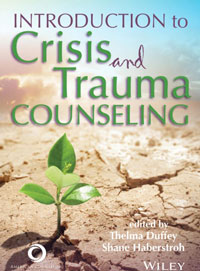 In Crisis and Trauma Counseling: Strategies for Effective Practice, edited by Thelma Duffey and Shane Haberstroh. Chapter 15, pp. 313–28. Alexandria, VA: The American Counseling Association (ACA), 2020. ISBN: 9781556203770 (paperback). In Crisis and Trauma Counseling: Strategies for Effective Practice, edited by Thelma Duffey and Shane Haberstroh. Chapter 15, pp. 313–28. Alexandria, VA: The American Counseling Association (ACA), 2020. ISBN: 9781556203770 (paperback).Abstract: |
 On December 13, 2016, Linda Hartling, along with many Oregon environmental friends, participated in a rally to stop the sale of Elliot State Forest to a private timber company. Following this, they attended the State Land Board Meeting with the Governor of Oregon, Kate Brown, where two hundred people attended, 80 people testified, and Linda and her friend Lois submitted their testimonies. Please see the follow-up article from the Oregonian newspaper. • Please click on the picture above to see it larger. |
| Impressions from Oregon, from top left: First row: Cannon Beach, with an oyster catcher bird at the end of the row Second row: Columbia River Gorge Falls; Multnomah Falls; Crater Lake; Finley Wildlife Refuge in Corvallis Third row: Mount Hood (first three pictures), and an eagle in Tryon Creek Park in Portland Fourth row: Mount St. Helens (in Washington State) from Linda's window, with a barn swallow on Mount St. Helens, and a pileated woodpecker near Linda's house • Please click on the pictures above or here to see more photos. |
| Linda M. Hartling, co-authored with Evelin G. Lindner (2018) "Can Systemic Humiliation Be Transformed Into Systemic Dignity?" In Systemic Humiliation in America: Finding Dignity within Systems of Degradation, edited by Daniel Rothbart. Chapter 2, pp. 19–51. Cham, Switzerland: Palgrave Macmillan, 2018. Print ISBN 978-3-319-70678-8, Online ISBN 978-3-319-70679-5. • Abstract: The United States, as in other nations, is in the midst of a social-climate crisis inflamed by a staggering economic gap between the rich and the poor, a polarized and paralyzed political system, a history of criminal injustice that has led to mass incarceration of marginalized populations, a proliferation of gun violence and rampage shootings, and much more. The contentious conditions shaping social relations in the United States are also evident in the atmosphere of heated interactions surging in the world. Social crises are complex, but we can no longer afford to overlook a phenomenon that plays a central role in fomenting and intensifying these crises, a dynamic that concurrently cripples our ability to respond to these developments. This chapter examines the plague of systemic humiliation, a rising infliction that degrades our social infrastructure and disrupts our immediate and long-term communal cohesiveness. Public policies and practices contaminated by unacknowledged cycles of humiliation generate hot embers in our society, resulting in potentially explosive conditions that frequently go unrecognized until it is too late. More than ever before, the elements that constitute systemic humiliation should be recognized as fundamental mechanisms in the formation of modern society. We will describe how the meaning of humiliation has changed as our sense of human dignity has grown and explore relational ways to replace systemic humiliation with a proliferation of dignity. Cultivating systemic dignity—at home and around the globe—creates space for mutually beneficial arrangements of relationships to emerge, relationships that protect and provide for the full participation, growth, and development of all members of society. |
| Parkland: A call for dignity By Linda M. Hartling and Evelin G. Lindner In Global Campaign for Peace Education, March 8, 2018. |
| The Psychology of Humiliation Interview with Linda Hartling and Evelin Lindner on Blog Talk Radio "3 Women 3 Ways" with Heather Stark, December 13, 2017, first airing Saturday, December 23. |
| Linda M. Hartling, co-authored with Evelin G. Lindner (2018) "Dignity in Times of Crises: Communicating the Need for Global Social Climate Change" 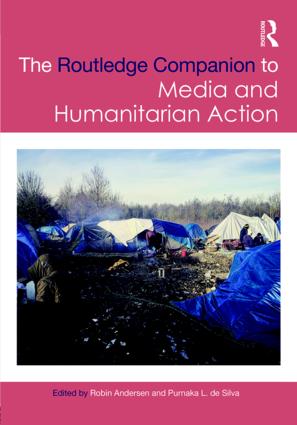 In Routledge Media and Humanitarian Action Handbook, edited by Purnaka L. de Silva and Robin Andersen. Chapter 4. Abingdon: Routledge, 2018. Preface by Sir Peter Sutherland, UN Special Representative of the Secretary-General on International Migration and Development. See also "'Red Alert' 2018 – Global Unity, Media & Humanitarian Action," by Purnaka L. de Silva, Inter Press Service, January 5, 2018. The book was launched at the UN Bookshop on December 7, 2017, hosted by UN-DPI, and moderated by Assistant Secretary-General Maher Nasser – where the two coeditors and fellow chapter contributor Under-Secretary-General Adama Dieng (Special Adviser to the Secretary-General on the Prevention of Genocide) addressed attendees with support from other chapter contributors who were present during the proceedings, which were broadcast online by UN Publications. In Routledge Media and Humanitarian Action Handbook, edited by Purnaka L. de Silva and Robin Andersen. Chapter 4. Abingdon: Routledge, 2018. Preface by Sir Peter Sutherland, UN Special Representative of the Secretary-General on International Migration and Development. See also "'Red Alert' 2018 – Global Unity, Media & Humanitarian Action," by Purnaka L. de Silva, Inter Press Service, January 5, 2018. The book was launched at the UN Bookshop on December 7, 2017, hosted by UN-DPI, and moderated by Assistant Secretary-General Maher Nasser – where the two coeditors and fellow chapter contributor Under-Secretary-General Adama Dieng (Special Adviser to the Secretary-General on the Prevention of Genocide) addressed attendees with support from other chapter contributors who were present during the proceedings, which were broadcast online by UN Publications.• Abstract: For all who work at the forefront and in the wake of global emergencies, this chapter will explore the urgent need for a new social climate to address these crises. It will define and describe humiliation as a dynamic that intensifies crises and disasters. It offers a discussion in support of media and human rights professionals, UN and government staff, academics, policymakers and practitioners, as well as victims and ordinary citizens who experience and witness humiliation and its consequences. Finally, it will discuss specific ways to begin dismantling the dynamics of humiliation by cultivating a new social climate—a climate of relationships strengthened by equal dignity. |
| Toward a Globally Informed Psychology of Humiliation: Comment on McCauley (2017) co-authored with Evelin G. Lindner, in American Psychologist, 72 (7), 705–06. doi: 10.1037/amp0000188. See Clark McCauley's article. |
Mini-Documentary of the Annual Human Dignity and Humiliation Studies Workshop on Transforming Humiliation and Violent Conflict "The Globalization of Dignity," December 8 - 9, 2016 Interview with Evelin Lindner - Challenges of our Time; Learning to Connect, December 8, 2016 Linda Hartling and Evelin Lindner in Dignilogue on "The Globalization of Dignity," December 8, 2016 (Video | Questions Prepared by Linda) Linda Hartling and Evelin Lindner in Dignilogue on the 2015 Nobel Peace Prize Nomination of Our Dignity Work, December 3, 2015 (Link to Nobel Peace Prize nomination page | Video | Powerpoint | see also Pdf 2014) A Global Dignilogue with Linda Hartling and Evelin Lindner, Honoring the Message of Alfred Nobel and Bertha von Suttner, December 3, 2015 (Link to Nobel Peace Prize nomination page | Video | Powerpoint | see also Pdf 2014) |
| Reflections on the 25th Dignity Conference in Rwanda in 2015 This report of the 25th Dignity Conference was written by Evelin Lindner in June and Linda Hartling was able to it cut down from 60 confidential pages to 20 public non-confidential pages. We have received clearance of the conference hosts, the Rwandan Commission of Reconciliation (NURC) and Emmanuel Ndahihama, to publish the final version on our website. We have reason to believe that also the President of Rwanda will read it most attentively. |
| A Global Dignilogue with Evelin Lindner and Linda Hartling (Pdf | Video) A dignilogue (dignity + dialogue) shared at the 2014 Workshop on Transforming Humiliation and Violent Conflict, Columbia University, New York City, December 4-5, 2014. |
| Linda M. Hartling, co-authored with Evelin G. Lindner, and Michael Britton, and Ulrich Spalthoff International Day of Democracy: The Contribution of the Human Dignity and Humiliation Studies Network (see also here, listen to Evelin Lindner reading the article) In Global Education Magazine, Nr. 5, Special Issue, "International Day of Democracy," 2013 (ISSN 1155 - 033X), invited by Javier Collado, Director of Edition of Global Education Magazine, a humanistic and educational magazine supported by the Regional Office of Latinamerica and the Caribbean of UNESCO and UNHCR. The initiative started after the most voted proposal on Rio+20. The Global Education Magazine promotes complex thinking as a way to achieve a holistic understanding of the Millennium Development Goals of the United Nations (MDG) by the world-society, creating a horizontal dissemination of the knowledge, where teachers, Nobel Prizes, volunteers, UN workers, students, etc. could share their reflections in a common space. See their academical philosophy, ISSN 2255-033X. |
 Linda M. Hartling, co-authored with Evelin G. Lindner, and Michael Britton, and Ulrich Spalthoff (2013) Linda M. Hartling, co-authored with Evelin G. Lindner, and Michael Britton, and Ulrich Spalthoff (2013)Beyond Humiliation: Toward Learning That Dignifies the Lives of All People By Linda M. Hartling, Evelin G. Lindner, Michael F. Britton, and Ulrich J. Spalthoff In: Gary P. Hampson, Matthew Rich-Tolsma (Eds.), Leading Transformative Higher Education Volume Two: Studies, Reflections, Questions, which forms the second volume of a three volume series titled Leadership in Transformation of Worldview and Higher Education, chapter 8, pp. 134-146, Olomouc, Czech Republic: Palacký University Olomouc Press, 2013. ISBN: 978-80-244-3918-1 |
| Human Dignity, Humiliation and Violent Conflict - Interview with Dr. Evelin Lindner and Dr. Linda Hartling The International Center for Ethno-Religious Mediation (ICERM) Radio is dedicated to promote positive interaction among people of different ethnicities and religious persuasions, and to increase tolerance, understanding and acceptance through programming that informs, educates, engages, mediates, and heals. Tziporah Pronman interviewed Evelin Lindner and Linda Hartling on December 4, 2013, upon invitation by Basil Ugorji. |
| How to Dialogue and Why: S. M. Miller (January 25, 2013) One of the most important skills we can develop as educators, organizers, leaders, and peace workers is the ability to initiate and facilitate mutually-dignifying dialogue! S. M. Miller dedicated his life to advancing this crucial skill as a community organizer and consultant to programs around the globe. Mike Miller coined the phrase verdict thinking, and Linda Hartling the phrase let-it-flow thinking. |
| Linda M. Hartling, co-authored with Christina Clark (2013) His Holiness the Dalai Lama Environmental Summit, May 9-11, 2013, Portland, Oregon. |
Linda M. Hartling, co-authored with Evelin G. Lindner, and Michael Britton, and Ulrich Spalthoff (2013) |
| Linda M. Hartling (2013) Greetings to All (long version), video created on 16h April 2013 for the 21st Annual Conference of Human Dignity and Humiliation Studies, 24th-27th April 2013, in Stellenbosch, South Africa. Greetings to All (short version), video created on 16h April 2013 for the 21st Annual Conference of Human Dignity and Humiliation Studies, 24th-27th April 2013, in Stellenbosch, South Africa. |
| Linda M. Hartling, co-authored with Evelin G. Lindner (2013) Healing Humiliation: From Reaction to Creative Action (Pdf) In: Journal of Counseling and Development (JCD), Special Section focussing on Relational Cultural Theory. • Abstract: In the midst of a confluence of global crises, feelings of humiliation are intensified. Local and global crises force individuals, communities, and nations to struggle with demoralizing disconnections and deprivations. Counselors and other clinicians are the social-psychological paramedics and healers on the front lines of suffering during these turbulent times. This paper explores how the dynamics of humiliation are coming to the forefront of concern at home and around the world. It will offer an analysis that places humiliation within a relational framework, identifying three categories of humiliation: (1) internal experience, (2) external interactions, and (3) systemic social conditions. It will examine the impact of humiliation using a case example that illustrates how counselors can lead clients out of destructive reactions into creative action. |
| Linda M. Hartling, co-authored with Evelin G. Lindner (first draft 2012) Healing Humiliation: From Reaction to Creative Action Accepted by the Journal of Counseling and Development (JCD), Special Section focussing on Relational Cultural Theory. • Abstract, draft 2012: In the midst of a confluence of global crises, feelings of humiliation are intensified. Local and global crises force individuals, communities, and nations to struggle with demoralizing disconnections and deprivations. Counselors and other clinicians are the social-psychological paramedics and healers on the front lines of suffering during these turbulent times. This paper explores how the dynamics of humiliation are coming to the forefront of concern at home and around the world. It will offer an analysis that places humiliation within a relational framework, identifying three categories of humiliation: (1) internal experience, (2) external interactions, and (3) systemic social conditions. It will examine the impact of humiliation using a case example that illustrates how counselors can lead clients out of destructive reactions into creative action. |
Linda M. Hartling (2012) • 02 Presenting the Frame of Appreciative Enquiry • 03 Introducing the Open Space Format to the HumanDHS Network |
| Linda Hartling, co-authored with Ulrich Spalthoff and Evelin G. Lindner (2011) Human Dignity and Humiliation Studies: A Global Network Advancing Dignity Through Dialogue In: Policy Futures in Education, 9 (1, Special Issue: The Council of Europe's White Paper on Intercultural Dialogue), pp. 66-73. and in: Besley, Tina and Michael Peters (Eds.) (2011), Interculturalism, Education and Dialogue, New York, Peter Lang. |
| Linda M. Hartling (2011) • 01 Linda Hartling: A Portrait In this video clip Linda Hartling presents herself. She is being introduced by Evelin Lindner. The clip was recorded on October 28, 2011, in Portland, Oregon, USA, by Annette Engler, for the World Dignity University (WDU) initiative. • 02 Relational-Cultural Theory "Relational-Cultural Theory" is a video clip that was recorded on October 30, 2011, in Portland, Oregon, USA, by Evelin Lindner, for the World Dignity University initiative. In this brief video presentation, Linda Hartling shares her work with Jean Baker Miller. Until November 3, 2008, Linda was the Associate Director of the Jean Baker Miller Training Institute (JBMTI) at the Stone Center, which is part of the Wellesley Centers for Women at Wellesley College, Wellesley, Massachusetts. Dr. Hartling was a member of the JBMTI theory-building group advancing the practice of the Relational-Cultural Theory, which is a new model of psychological development. In addition, Dr. Hartling coordinated and contributed to training programs, publications, and special projects for the JBMTI. She holds a doctoral degree in clinical/community psychology and has published papers on resilience, substance abuse prevention, shame and humiliation, relational practice in the workplace, and Relational-Cultural Theory. Dr. Hartling is coeditor of The Complexity of Connection: Writings from the Jean Baker Miller Training Institute at the Stone Center (2004) and author of the Humiliation Inventory, a scale to assess the internal experience of derision and degradation. • 03.1 Appreciative Enquiry 1, a video that was recorded on October 30, 2011, in Portland, Oregon, USA, by Evelin Lindner, for the World Dignity University initiative. • 03.2 Appreciative Enquiry 2, a video that was uploaded onto YouTube on August 11, 2012, in preparation of the 19th Annual Conference of Human Dignity and Humiliation Studies, 27th-30th August 2012, in Oslo, Norway. • 03.3 Our Appreciative Frame 3, a video created in December 2014 (see also Pdf), for the 2014 Workshop on Transforming Humiliation and Violent Conflict, in New York City, December 4–5, 2014. • 03.4 Appreciative Enquiry 4, a video that was recorded on May 27, 2015, in Portland, Oregon, USA, by Linda Hartling, for the 25th Annual Conference of Human Dignity and Humiliation Studies, in Kigali, Rwanda, 2nd - 5th June 2015. In these brief video presentations, Linda Hartling shares her adaptation of the appreciative inquiry (sic) approach as it was originally developed by David Cooperrider at Case Western Reserve University. She writes August 2004 (see more on the Appreciative Enquiry or "Waging good Conflict" page on this website): "For me our approach means daring to "move toward mutuality" in all of our efforts. I conceptualize "movement toward mutuality" as an powerful act of resistance to organizational practices that implicitly or explicitly propagate exploitation. In "Relational-Cultural-Organizational Theory" (my variation on RCT), exploitation might be called "relational-organizational malpractice" (a variation of Joyce Fletcher's term). Far too many for-profit and nonprofit organizations depend on countless forms of relational-organizational malpractice, including shameless exploitation. Whether this occurs in an organization that is working for good or not, it is still malpractice." • 04 Human Dignity, Human Rights, and Sustainable Post-Disaster Reconstruction: An Introduction by Linda Hartling and Evelin Lindner "Human Dignity, Human Rights, and Sustainable Post-Disaster Reconstruction: An Introduction by Linda Hartling and Evelin Lindner" is a video clip that was recorded on October 30, 2011, in Portland, Oregon, USA, by Linda Hartling and Evelin Lindner, for a course with the same title for Professor Adenrele Awotona's Center for Rebuilding Sustainable Communities after Disasters at the University of Massachusetts, Boston, as well as for the World Dignity University (WDU) initiative. Course Description: Understanding the intersecting dynamics of human dignity, humiliation, and human rights in today’s world is crucial for those working in post-disaster reconstruction. Greater awareness of human rights ideals brings to the forefront the risk that post-disaster strategies and responses, once accepted and considered helpful, are perceived as deeply humiliating. This course will explore how globalization dramatically alters how we engage in helping relationships at all levels. It proposes that post-disaster reconstruction can be an opportunity to implement innovative and sustainable solutions that support the healing, health, and dignity of all involved in post-disaster recovery. • 05 Human Dignity, Human Rights, and Sustainable Post-Disaster Reconstruction: Evelin Lindner's Contribution "Human Dignity, Human Rights, and Sustainable Post-Disaster Reconstruction: Evelin Lindner's Contribution " is a video clip that was recorded on October 30, 2011, in Portland, Oregon, USA, by Linda Hartling and Evelin Lindner, for a course with the same title for Professor Adenrele Awotona's Center for Rebuilding Sustainable Communities after Disasters at the University of Massachusetts, Boston, as well as for the World Dignity University (WDU) initiative. Course Description: Understanding the intersecting dynamics of human dignity, humiliation, and human rights in today’s world is crucial for those working in post-disaster reconstruction. Greater awareness of human rights ideals brings to the forefront the risk that post-disaster strategies and responses, once accepted and considered helpful, are perceived as deeply humiliating. This course will explore how globalization dramatically alters how we engage in helping relationships at all levels. It proposes that post-disaster reconstruction can be an opportunity to implement innovative and sustainable solutions that support the healing, health, and dignity of all involved in post-disaster recovery. See the chapter by Evelin Lindner "Disasters As a Chance to Implement Novel Solutions that Highlight Attention to Human Dignity," in Awotona, Adenrele (Ed.), Rebuilding Sustainable Communities for Children and their Families after Disasters: A Global Survey, chapter 21, pp. 335-358, Proceedings of the International Conference on Rebuilding Sustainable Communities for Children and Their Families after Disasters, convened by Adenrele Awotona at the College of Public and Community Service University of Massachusetts at Boston, USA, November 16-19, 2008, published by Cambridge Scholars Publishing (Newcastle upon Tyne), and as e-book by MyILibrary (LaVergne, TN), 2010. |
| Hartling, Linda M. (2010) The Power of Right Relationships: Encouraging Creativity through Connection Presentation given at the Association of Creativity in Counseling National Conference, a Division of the American Counseling Association, Portland, Oregon, September 18th, 2010. |
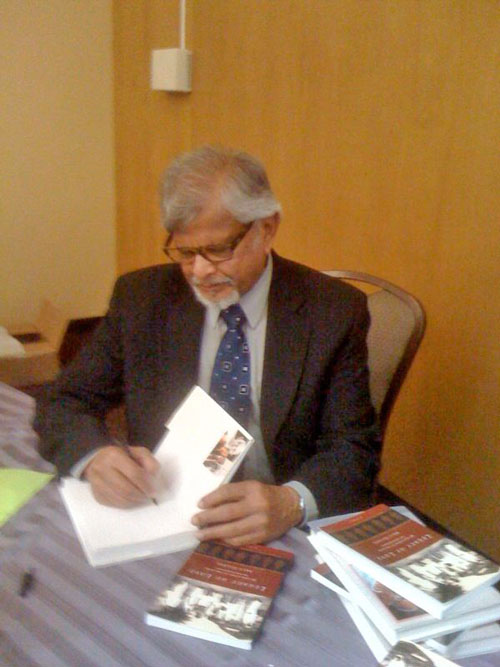 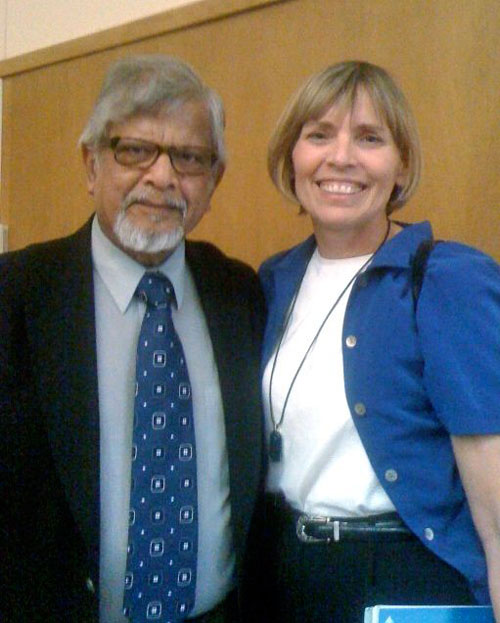 |
| September 20, 2009, meeting with Arun Gandhi at the "Messages of Peace" Conference, at Marylhurst University in Marylhurst, Oregon. Gandhi described the crucial lessons he learned from his grandfather, Mahatma Gandhi, about the lifelong practice of nonviolent action. In addition, he offered a rare glimpse into how the women in his grandfather's life shaped the development of nonviolent principles and practices. Please click on the pictures above to see them larger! |
| Hartling, Linda M. (2010) An Appreciative Frame: Beginning a Dialogue on Human Dignity and Humiliation Updated introductory text prepared for "Peace at Home, Peace in the World," 15th Annual Meeting of Human Dignity and Humiliation Studies in Istanbul, Türkiye, April 28-30, 2010. |
| Hartling, Linda M. and Evelin G. Lindner (2009) Dignity or Humiliation in Economic and Monetary Systems: Toward a System of “Right Relationships,” Paper in progress prepared for the 13th Annual Conference of Human Dignity and Humiliation Studies (HumanDHS), in Honolulu, Hawaii, August 20 to 22, 2009. |
| Hartling, Linda M. (2007) From Humiliation to Appreciation: Walking Toward Our Talk Presentation at the Wellesley Centers for Women at Wellesley College, Wellesley, Massachusetts, USA. |
| Hartling, Linda M. (2006) Bykr, A. S. and B. Schneider (2002). Trust in Schools: A Core Resource for Improvement. New York, Russell Sage Foundation. Please see the notes that Linda made on this book. |
| Hartling, Linda M. (2006) From Humiliation to Appreciation: Walking Toward Our Talk Abstract prepared for the Second International Conference on Multicultural Discourses, 13-15th April 2007, Institute of Discourse and Cultural Studies, & Department of Applied Psychology, Zhejiang University, Hangzhou, China, as part of the 9th Annual Meeting of Human Dignity and Humiliation Studies. |
| Jordan, Judith V., and Hartling, Linda M. (2006) Relationship Tips Jean Baker Miller Training Institute. |
| Hartling, Linda M. (2005) Humiliation: Real Pain, A Pathway to Violence Preliminary draft of a paper prepared for Round Table 2 of the 2005 Workshop on Humiliation and Violent Conflict, Columbia University, New York, December 15-16, 2005. |
| Hartling, Linda M. (2005) Humiliation and Assistance: Telling the Truth About Power, Telling a New Story Paper prepared for "Beyond Humiliation: Encouraging Human Dignity in the Lives and Work of All People," 5th Annual Meeting of Human Dignity and Humiliation Studies in Berlin, 15th -17th September, 2005. |
| Hartling, Linda M. (2005) An Appreciative Frame: Beginning a Dialogue on Human Dignity and Humiliation Introductory text prepared for "Beyond Humiliation: Encouraging Human Dignity in the Lives and Work of All People," 5th Annual Meeting of Human Dignity and Humiliation Studies in Berlin, 15th -17th September, 2005. |
| Hartling, Linda M. (2004) Fostering Resilience throughout Our Lives: New Relational Possibilities. In D. Comstock (Ed.), Diversity in Development: Critical Contexts that Shape Our Lives and Relationships. Pacific Grove, CA: Thomson/Wadsworth. |
| Jordan, J. V., Walker, M., & Hartling, L. M. (Ed.). (2004) The Complexity of Connection: Writings from the Stone Center's Jean Baker Miller Training Institute. New York: Guilford Press. |
| Hartling, Linda M. (2003) Strengthening Resilience in a Risky World: It is All About Relationships. Work in Progress, No. #101. Wellesley, MA: Stone Center Working Papers Series. |
| Hartling, Linda M. (2003) Prevention Through Connection: A Collaborative Response to Women's Substance Abuse. Work in Progress, No. #103. Wellesley, MA: Stone Center Working Papers Series. |
| Hartling, L. M., Miller, J. B., & Jordan, J. V. (2003) An Introduction to Relational-Cultural Theory Project Report, No. 10. Stone Center Working Papers Series. |
| Jordan, J. V., & Hartling, L. M. (2002) "New Developments in Relational-Cultural Theory." In M. Ballou & L. Brown (Eds.), Rethinking Mental Health and Disorder. New York: Guilford Press. |
| Hartling, L. M., & Sparks, E. (2002) Relational-Cultural Practice: Working in a Nonrelational World. Work in Progress, No. #97. Wellesley, MA: Stone Center Working Papers Series. |
| Hartling, L. M., & Ly, J., Nassery, N., & Califa, K. (2007) Relational References: A Selected Bibliography of Research, Theory, and Applications Project Report #7. Wellesley, MA: Stone Center Working Papers Series. |
| Hartling, L. M., Rosen, W., Walker, M., & Jordan, J. V. (2000) Shame and Humiliation: From Isolation to Relational Transformation Work in Progress, No. 88. Wellesley, MA: Stone Center Working Paper Series. |
| Hartling, Linda M., Luchetta, Tracy (1999) Humiliation: Assessing the Impact of Derision, Degradation, and Debasement First published by: The Journal of Primary Prevention, 19(4): 259-278. |
| Hartling, Linda M. (1995/1996) Humiliation: Assessing the Specter of Derision, Degradation, and Debasement Doctoral dissertation. Cincinnati, OH: Union Institute Graduate School. |
| See Works in Progress, a publication series developed by the two organizations that were the precursors to the International Center for Growth in Connection: the Stone Center and the Jean Baker Miller Training Institute, both at Wellesley College. |

